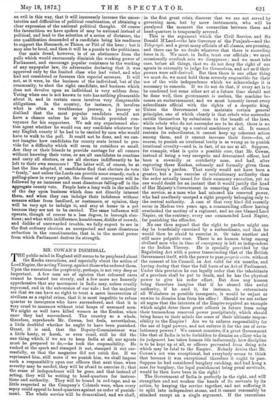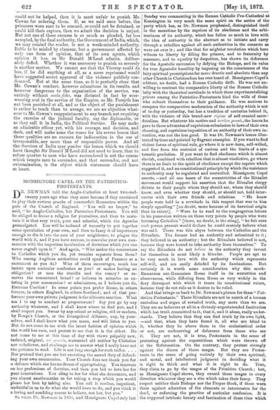MR. COWAN'S DISMISSAL.
THE public mind in England still seems to be perplexed about the Hooka executions, and especially about the action of Lord Napier, the acting Viceroy, against those who ordered them Upon the executions the perplexity, perhaps, is not very deep or important. A few men are of opinion that coloured races cannot be treated too sternly, and a few more are honestly apprehensive that any movement in India may, unless cruelly repressed, end in the subversion of our rule ; but the majority see that we can have no right to treat a mere insurrection of civilians as a capital crime, that it is most impolitic to refuse quarter to insurgents who have surrendered, and that it is very cruel to massacre without trial heaps of unarmed men. We might as well have killed women as the Kookas, when once they had surrendered. The country as a whole, therefore, reprehends Mr. Cowan, but feels, nevertheless, a little doubtful whether he ought to have been punished. Grant, it is said, that the Deputy-Commissioner was a little hasty, or harsh, or even cruel, still he did the one thing which, if we are to keep India at all, our agents must be prepared to do,—he took the responsibility. He rushed at the spark and stamped it out, stamped it out suc- cessfully, so that the magazine did not catch fire. If we reprimand him, still more if we punish him, we shall impose such a responsibility upon our officers that next time, when severity may be needed, they will be afraid to exercise it; that the sense of independence will be gone, and that instead of acting, they will be writing to head-quarters for instruc- tions and authority. They will be bound in red-tape, and as little respected as the Company's Colonels were, when every sepoy could appeal to head-quarters against an order of punish- ment. The whole service will be demoralised, and we shall,
in the first great crisis, discover that we are not served by governing men, but by mere instruments, who will be paralysed the moment the connection between them and head-quarters is temporarily severed.
This is the argument which the Civil Service, and Sir Donald M'Leod—the late Governor of the Punjaub—and the Telegraph, and a great many officials of all classes, are pressing, and there can be no doubt whatever that there is exceeding force in it. We must, in India, trust our officials ; we must occasionally overlook acts we disapprove ; and we must take care, before all things, that we do not deny the right of our agents in extremity to judge for themselves, and act as if their powers were self-derived. But then there is one other thing we must do, we must hold them severely responsible for their use of the wide independence which we acknowledge it is necessary to concede. If we do not do that, if every act is to be condoned lest some other act at a future time should not be done well, then government is useless, the machine be- comes an embarrassment, and we must honestly invest every subordinate official with the rights of a despotic king. Unless the Government can maintain certain general principles, one of which clearly is that rebels who surrender entitle themselves by submission to the benefit of the laws, while rebels who do not surrender are to be shot, there is no reason for keeping up a central machinery at all. It cannot restrain its subordinates, it cannot keep up coherent action among them, and it cannot increase their force—for, of course, to punish an irrational lenity is as wrong as to punish irrational severity—and is, in fact, of no use at all. Suppose, for example, what is quite a possible case, that Mr. Cowan, instead of being a very energetic and determined officer, had been a cowardly or crotchetty man, and had, after capturing these Kookas, solemnly and formally given them the Viceroy's pardon. That surely would not have been a. greater, but a less exercise of revolutionary authority than the order actually issued for their summary execution, yet no one would doubt for an instant that it would justify the head of Her Majesty's Government in removing the offender from the service, as a man who had misused his reserved power, who had needlessly usurped a right properly belonging only to• the central authority. A case of that very kind did recently occur in Madras two years ago, a commanding officer having overlooked the mutiny of a regiment, and no one blamed Lord Napier, on the contrary, every one commended Lord Napier, for punishing the offender.
No one then argued that the right to pardon might one day be beneficially exercised by a surbordinate, and that he would then be afraid to exercise it. Or take another and still more palpable case. There is no human being among civilised men who in time of emergency is left so independent as the Indian Viceroy. He is specially provided by the Regulating Act with a power transcending that of the British Government itself, with the power to pass proprio meta, without the consent of his Council, an Act valid for six months, and having during that time the full force of an Act of Parliament. Under this provision he can legally order that the inhabitants of a province shall be put to death, and he has the physical power to give his order effect. But does any human being therefore imagine that if he abused this awful authority, if he used it, for instance, to exterminate all Wahabees as possible insurgents, it would be unjust or unwise to dismiss him from his office ? Should we not rather all argue that the interests of the Empire required an example which might deter these great officers in future from using their tremendous reserved power precipitately, which should bring home to their minds the sense of their ultimate respon- sibility to the Empire ? Are we to enforce responsibility for
the use of legal powers, and not enforce it for the use of revo- lutionary powers ? We cannot conceive, if a great Government like that of India is to be forbidden to dismiss an officer who in its judgment has taken human life indiscreetly, how discipline is to be kept up at all, or officers prevented from doing acts which may be fatal to the Empire. Nobody denies that Mr.
Cowan's act was exceptional, but everybody seems to think that because it was exceptional therefore it ought to pass.
Suppose he had considered burglary catching, and had hung a man for burglary, the legal punishment being penal servitude, would he then have been in the right ? The Government of India is perfectly in the right, and will strengthen and not weaken the hands of its servants by its action, by keeping the service together, and not suffering it to split into independent atoms, and it cannot reasonably be attacked except on a single argument. If the executions
could not be helped, then it is most unfair to punish Mr. Cowan for ordering them. If, as we said once before, the prisoners were sure to be rescued, or could not be detained, or could kill their captors, then we admit the decision is unjust. But not one of these excuses is so much as pleaded, far less accepted, by the final authority, the Government of India, which, we may remind the reader, is not a weak-minded authority, liable to be misled by clamour, but a government affected by only one form of opinion, that of its own agents, which opinion it has, as Sir Donald M'Leod admits, deliber- ately defied. Whether it was necessary to punish so severely is another matter. We cannot see that the Viceroy could do less, if he did anything at all, as a mere reprimand would have suggested secret approval of the violence publicly con- demned. But at the same time, as it is perfectly clear that Mr. Cowan's conduct, however calamitous in its results, and however dangerous to the organisation of the service, was entirely without nzala fides, was dictated in fact by over- weening zeal in the service of the Empire, as Mr. Forsyth has not been punished at all, and as the object of the punishment is rather to teach than to avenge, we see no objection what- ever to Mr. Cowan's reappointment to any branch not requiring the exercise of the judicial faculty, say the diplomatic, or as they call it in India, the Political Service. He may make an admirable officer yet, with his courage, and decision, and dash, and will make none the worse for his severe lesson that these qualities are no excuses for indiscretion in the use of irresponsible, any more than of responsible power. And all the Services of India may ponder the lesson which we should have thought Sir Donald M'Leod did not need to learn, that to refuse quarter to men who have surrendered is not the course which tempts men to surrender, and that surrender, and not extermination, is the object which statesmen should have at heart.



































 Previous page
Previous page